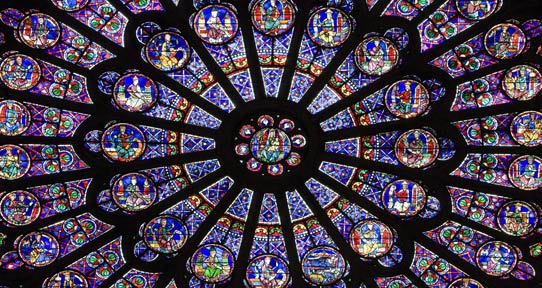Learning outcomes

The teaching philosophy of the Program of Medieval Studies relies on humanist values: the respect of others, the belief that knowledge and understanding of other cultures and languages build this respect, the persuasion that dialogue is a way of discovering the world, our communities and ourselves. Inclusive in its contents (which question the traditional focus on Western Europe and are attentive to the encounters and exchanges with others that make a collective identity), the program is also keen on providing experiential learning opportunities, such as workshops, research projects, and public presentations. For one often learns by doing.
The learning objectives of the Medieval Studies Program comprise both specific goals that relate to the study of Medieval cultures and societies, and broader skills that are common to most areas of Humanistic study. We believe that a graduate of the Medieval Studies Program (Major or Honours) will have developed not just a deep appreciation of the cultures of the Medieval period, but a range of important transferable skills – in research, analysis of data, presentation of evidence, and communication in writing and speech – that will equip the student for both the job market and postgraduate study.
Our objectives are that students should:
- Possess an understanding of the general historical development and main cultural achievements of the Medieval period in Europe and the Mediterranean. This also applies, to a more limited extent, to the Islamic world (principally the Middle East, North Africa, and the Iberian Peninsula).
- Develop the ability to read primary sources of the Medieval period, forming an appreciation of the attitudes and beliefs of past cultures.
- Correlate different types of evidence – textual, archaeological, visual, and so on – in the reconstruction of past events and societies.
- Understand the fundamental beliefs and practices of the major religions of Medieval Europe, North Africa, and the Middle East (i.e., Judaism, Christianity, and Islam), and the ways in which these religions affected political, social, and intellectual life, particularly where they were combined with or replaced pre-existing religious beliefs and practices (e.g., in northern Europe or the Arabian peninsula).
- Appreciate the diverse character of cross-cultural interaction in the Medieval period, and the ways in which these interactions shaped or changed communities.
- Study the enduring impact of the classical Graeco-Roman culture and Late-Antique Mediterranean cultures upon the Medieval world (encompassing both Christian and Islamic polities).
For Honours students in the Medieval Studies Program we also require that they:
- Develop readings skills in a language appropriate for the study of Medieval primary sources (such as Latin, French, Greek, Spanish, or German).
- Learn the skills needed to undertake a more sustained research project. (This pertains to the Honours graduating essay, MEDI 499, and is designed to introduce students to the skills needed for post-graduate study.)
The goals of a more generalized character are that students:
- Develop a critical approach to the reading of the argumentation and presentation of evidence in secondary sources.
- Analyse primary and secondary sources in order to construct an interpretation of the available evidence.
- Present a personal interpretation of evidence using a clear, well structured writing style.
- Be able to express ideas coherently in oral presentations (also make use of visual materials, such as powerpoint slides).
The values expressed are developed through the mode of instruction and the assessments commonly employed in MEDI courses at the 200-, 300- and 400-level. In teaching we place considerable emphasis upon the analysis of primary texts – in translation – and other types of primary evidence, including archaeological data, visual arts, and architecture. Students learn to approach these different forms of primary evidence, using appropriate methodological tools. The aim is to understand texts and other forms of evidence in their precise historical/cultural contexts. In-class discussions also allow students to question the unfamiliar attitudes and values they often encounter when looking at the writings of Medieval authors. The students are also introduced to the dominant interpretations of specific Medieval themes in modern scholarship . During in-class discussions are encouraged to compare and evaluate different interpretations, and to form their own opinions.
